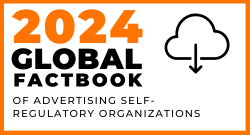Self-regulatory Advertising Standards and Codes exist to ensure that advertisements and all forms of marketing communications are prepared with a due sense of social responsibility. Among the basic principles incorporated in ad standards worldwide are the fact that ads should be legal, decent, honest and truthful. Moreover, ads should conform to the principles of fair competition, as generally accepted in business.
Advertising standards provide an additional layer of consumer protection that complements the legal framework. Whereas legislation lays down broad principles, e.g. that advertising should not be misleading, self-regulatory standards have the advantage of offering more flexibility, e.g. when addressing ethical rather than legal concerns. They offer a quick and efficient way to assess the appropriateness of individual ads at no cost to the taxpayer.
The ICC Marketing Code is considered as the global benchmark for advertising self-regulation. It is complemeted by several guidances notes and recommendations addressing different aspects of advertising such as the marketing of alcohol products or the use of online behavioural advertising (OBA) techniques.
However, like advertising itself, ad standards need to be tailored to national specificities to ensure to take into account the different social, cultural and linguistic preferences of consumers. This is why individual countries have their own national standards in place, the implementation of which is monitored by a self-regulatory organization (SRO).

